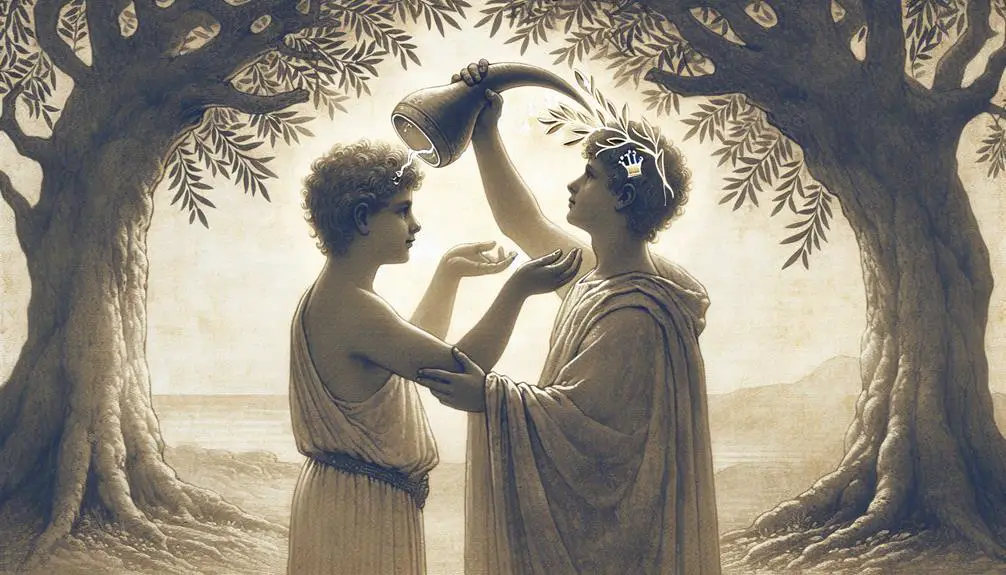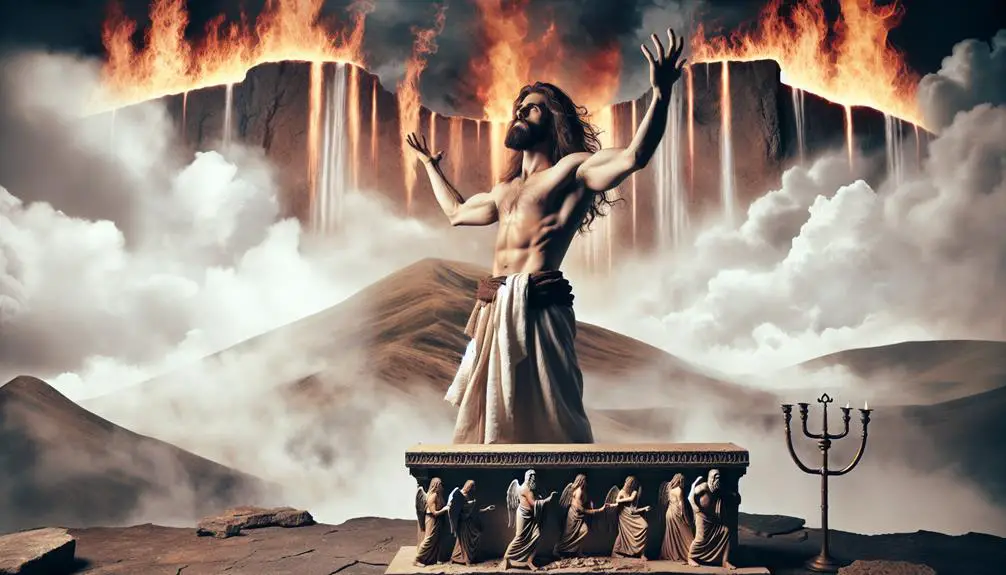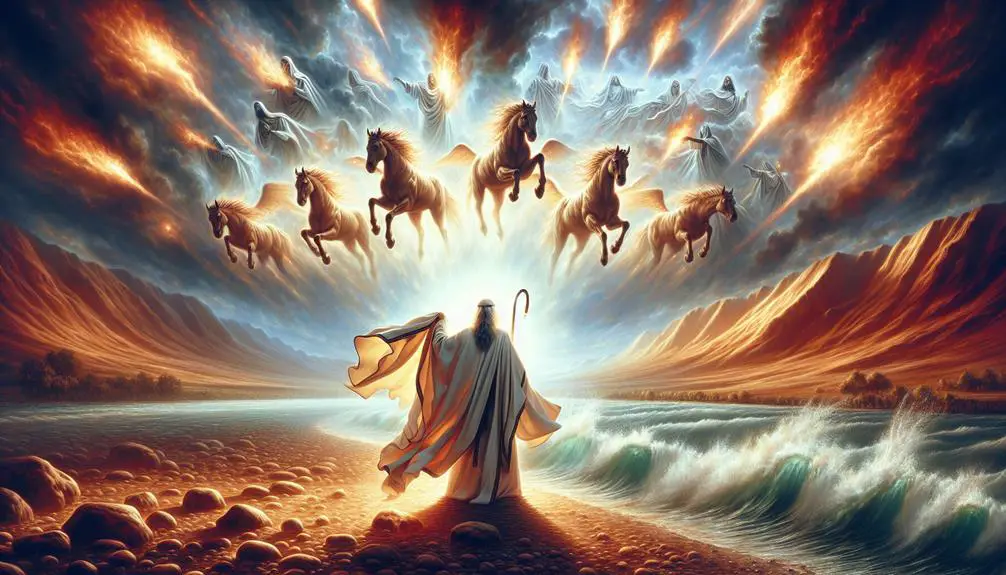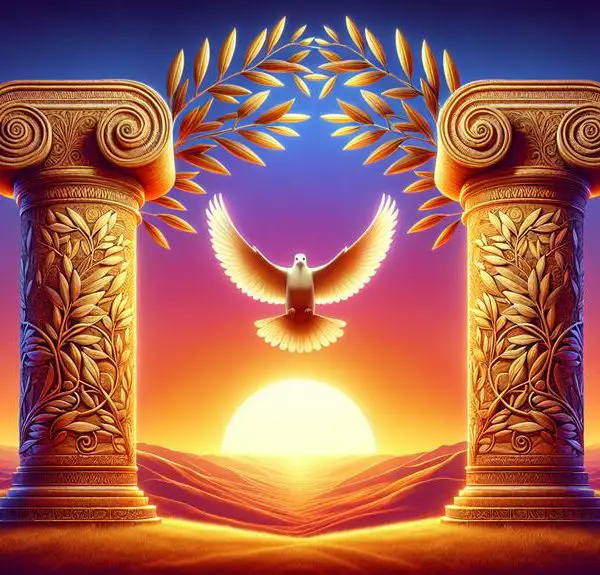From Samuel to John, discover how biblical seers shaped history with divine visions, leaving an indelible mark on faith and prophecy.

Seers in the Bible
In exploring the multifaceted role of seers within the biblical narrative, one embarks on a journey through ancient texts that reveal not only the profound spiritual insights and prophecies they provided but also their integral role in shaping the course of Israelite history and theology.
From Samuel's anointing of kings to Isaiah's messages of redemption, these figures stand as pivotal conduits between the divine and the mortal realm. As we examine the lives and legacies of these individuals, such as Elijah's confrontations and John's apocalyptic visions, a deeper understanding of their impact and the enduring significance of their messages unfolds, inviting further exploration into their mysterious and sacred world.
Key Takeaways
- Seers served as divine intermediaries, offering guidance and interpreting God's will for the people.
- Through miraculous actions, seers like Samuel, Elijah, and Elisha demonstrated divine authority and influenced Israel's history.
- Messages from seers often centered on redemption, restoration, and the promise of divine intervention in human affairs.
- Their prophecies balanced warnings of divine wrath with assurances of mercy and covenant faithfulness, emphasizing faith's transformative power.
The Role of Seers

Functioning as divine intermediaries, seers in the biblical context played a pivotal role in communicating God's will and guidance to the people and their leaders. These figures, often enveloped in mystery, were entrusted with the significant task of bridging the human and divine realms. Through their unique abilities to receive and interpret visions, seers were central to the spiritual and sometimes political direction of their communities.
The responsibilities of seers extended beyond mere prophecy. They were tasked with vision interpretation, a critical aspect that required not only an intrinsic connection to the divine but also a profound understanding of their contemporary socio-political landscape. This dual insight enabled them to decipher divine messages in a way that was both relevant and actionable for their audience. Vision interpretation was not a passive act; it demanded a deep engagement with the symbolic and often cryptic language through which the divine communicated. Seers had to navigate these complexities, translating celestial insights into guidance that could be feasibly implemented within their societal context.
Moreover, the role of seers was inherently linked to the spiritual well-being of the people they served. Through their interpretations, they provided counsel, warned of divine displeasure, and offered hope, thereby influencing not just individual lives but the broader course of communities and nations. Their ability to foresee and interpret was thus a cornerstone of biblical leadership and decision-making processes, underscoring the integral role that spiritual insight played in ancient societies.
Samuel: The Kingmaker

Among the most pivotal figures in the biblical narrative, Samuel stands out for his critical role in the establishment of Israel's monarchy, acting as a divine intermediary in the anointing of its first kings. Samuel's birth itself was miraculous, foretold to his barren mother, Hannah, in a divine promise. This event set the stage for his destiny as a spiritual leader and kingmaker in Israel.
Samuel's life and ministry mark a transition from the era of the judges to the establishment of a unified monarchy under Saul and later David. His role as a prophet, judge, and seer positioned him uniquely to influence Israel's political and spiritual landscape.
- Samuel's anointing of Saul as the first king of Israel was a significant act that signified God's approval and Saul's divine right to rule. However, Saul's reign would later be marred by disobedience and moral failure.
- Saul's rejection by God as king was directly communicated by Samuel, underscoring the prophet's role as God's mouthpiece. Samuel's rebuke to Saul for his disobedience is a pivotal moment, highlighting the importance of divine approval in leadership.
- The search for a new king led Samuel to Bethlehem, where he anointed David, a young shepherd, marking the beginning of a new era in Israel's history.
- Samuel's actions and decisions were instrumental in shaping the course of Israelite history, demonstrating the profound impact of divine guidance and prophecy.
In his capacity as a seer and prophet, Samuel's influence extended beyond mere political leadership, affecting spiritual guidance and moral governance. His legacy as a kingmaker set a precedent for the interplay between divine will and royal authority in Israel's history.
Elijah: The Fiery Prophet

Transitioning from the era of judges and kingmakers, Elijah emerges as a defining prophet in the narrative of the Bible, renowned for his miraculous deeds and unwavering commitment to upholding God's commands. His story, deeply embedded within the complexities of Israel's monarchical history, showcases the tension between divine authority and earthly power. A pivotal moment in Elijah's ministry occurs on Mount Carmel, where his confrontation with the prophets of Baal underscores the central theme of divine supremacy. This event not only solidifies Elijah's status as a prophet of God but also serves as a dramatic demonstration of God's power over false idols.
Elijah's journey, however, is not devoid of personal struggle. His experiences with depression, notably after the Mount Carmel victory, provide a nuanced understanding of his character. Following a significant triumph, Elijah finds himself fleeing from Jezebel's wrath, leading to a period of existential despair. This episode reveals the human aspect of prophetic ministry, showcasing how even the most faithful can encounter moments of doubt and loneliness. Elijah's vulnerability in this instance contrasts sharply with his earlier displays of divine confidence, offering a profound commentary on the nature of faith and the complexities of serving as God's messenger.
Analyzing Elijah's narrative, his confrontation on Mount Carmel, and his subsequent struggle with depression underscores the multifaceted role of prophets in the Bible. They are not only vehicles of divine will but also individuals navigating the challenges of their missions amidst personal and societal turmoil. Elijah's story, rich in miracles and human emotion, offers a compelling exploration of faith, power, and the pursuit of divine purpose.
Elisha: Miracles and Visions

Following the narrative of Elijah, the transition to Elisha introduces a figure whose contributions encapsulate a complex interplay of prophetic insights, healing, and miracles, marking a distinct evolution in the portrayal of seers within the biblical text.
Elisha's tenure is characterized by a series of acts that not only underscore his divine mandate but also illustrate the broadening scope of prophetic engagement with the socio-political and individual dilemmas of the time.
An analysis of these elements reveals the multifaceted role of Elisha, positioning him as a pivotal figure in the continuum of biblical prophecy and its manifestation through miraculous interventions and visionary insights.
Elisha's Prophetic Insights
Elisha, a prominent biblical figure, demonstrated profound prophetic insights through a series of miraculous events and visionary experiences that underscore his significant role in the narrative of the Hebrew Scriptures. His actions and prophecies were not only spiritual but had geopolitical influence, ensuring his position in the spiritual succession from his mentor, Elijah. Here are key aspects of Elisha's prophetic insights:
- Geopolitical Influence: Elisha's prophecies often intersected with the political landscape, influencing kings and nations.
- Spiritual Succession: He seamlessly continued Elijah's mission, solidifying the transition of prophetic authority.
- Divine Communication: Elisha's visions provided critical divine insight into Israel's future.
- Strategic Counsel: His advice to Israel's kings based on divine revelations often swayed military and political decisions.
Healing and Miracles
Beyond his geopolitical influence and spiritual succession, Elisha's tenure as a prophet was marked by a series of miraculous healings and supernatural phenomena that further established his divine mandate. His interventions not only altered the physical realm but also offered profound insights into spiritual discernment and the dynamics of faith.
Each miracle, from the purification of water to the resurrection of the Shunammite's son, served as a testament to the power of unwavering belief and the direct intervention of the divine in human affairs. These events underscore the interplay between divine will and human agency, highlighting the transformative potential of faith when coupled with divine favor.
Elisha's miracles thus offer a rich tapestry for understanding the complexities of spiritual discernment and faith dynamics in the biblical narrative.
Isaiah: Messages of Redemption

In the prophetic writings of Isaiah, a central theme emerges, focusing on the promise of redemption and restoration for the people of Israel. Isaiah's messages are deeply interwoven with the concepts of judgement prophecies and Covenant faithfulness, illustrating a complex relationship between divine wrath and mercy. This duality serves as a foundational element in understanding the overarching message of redemption that Isaiah conveys.
Isaiah's prophecies oscillate between forewarnings of judgement due to the people's unfaithfulness and the subsequent promises of salvation, predicated on their return to covenant adherence. This juxtaposition highlights a profound theological principle: despite the inevitability of divine judgement, God's steadfast love and commitment to His covenant promises redemption and restoration.
To elucidate, consider the following key aspects of Isaiah's messages of redemption:
- The Servant Songs: These passages vividly depict a figure whose sufferings and subsequent exaltation embody the mechanism through which God intends to bring salvation to His people.
- The New Heaven and New Earth: Isaiah envisions a future where all creation is renewed, symbolizing the ultimate fulfillment of God's promises of redemption and restoration.
- The Peaceful Kingdom: Imagery of a harmonious kingdom underlines the transformative power of God's redemption, where natural enmities are reconciled.
- Universal Salvation: Isaiah extends the promise of redemption beyond Israel to include all nations, suggesting a universal scope to God's salvific plan.
Analyzing these themes within Isaiah's prophetic writings reveals a multifaceted portrayal of redemption that is both imminent in the face of judgement and transcendent, pointing towards a future where God's faithfulness brings about a restored creation.
John the Revelator: Apocalyptic Visions

John the Revelator's apocalyptic visions, as chronicled in the Book of Revelation, present a complex tapestry of symbolism, prophecy, and eschatology that has intrigued scholars and theologians for centuries. Written during his Patmos exile, this canonical text is the culmination of apocalyptic literature in the Bible, offering a vivid portrayal of the end times through a series of divine revelations.
The narrative structure of Revelation, intertwined with its symbolic imagery, serves multiple interpretative layers that reflect the political, social, and spiritual unrest of John's time. The Patmos exile context is critical; it was not merely a backdrop but a catalyst that influenced the vividness and urgency of John's visions. This period of isolation and persecution under Roman rule is mirrored in the text's themes of triumph over oppression and the ultimate victory of good over evil.
Symbolic imagery is a cornerstone of John's revelations, imbued with deep theological significance. Symbols such as the beast, the lamb, and the dragon are not literal representations but are laden with metaphorical meanings, drawing from Old Testament prophecies and contemporary cultural references. This usage of symbolic language was not only a way to veil the critique of Roman imperialism but also to communicate the universality and timelessness of the visions' messages.
Analyzing John's apocalyptic visions reveals a multi-faceted interpretation of divine justice, human morality, and the ultimate reconciliation between God and creation. The Book of Revelation, therefore, stands as a testament to the enduring power of faith amidst adversity, offering hope and vindication to the faithful through its complex allegorical narrative.
Frequently Asked Questions
How Did the Societal Perception of Seers Differ Between the Old and New Testaments?
The societal perception of individuals capable of divine communication underwent significant cultural shifts between earlier and later periods.
In the initial era, these figures were revered and closely consulted for guidance. However, as time progressed and new philosophical and theological frameworks emerged, the reliance on such individuals for divine insight noticeably decreased.
This evolution reflects broader cultural transformations regarding the nature of spiritual authority and the mechanisms of divine revelation.
Were There Any Female Seers in the Bible, and What Was Their Impact?
Exploring the role of female seers reveals nuanced gender dynamics within spiritual narratives. A notable example is Deborah, whose story underscores the intersection of gender and spiritual authority.
As a prophetess and judge, her impact extended beyond mere foresight, influencing military and political decisions. This analysis highlights how female seers, despite societal constraints, wielded significant spiritual authority, challenging traditional gender roles and contributing to the religious and social fabric of their time.
How Did the Functions and Roles of Seers Evolve Over Time Within Biblical History?
The evolution of seers' functions and roles throughout history reveals a dynamic relationship between divine communication and societal needs.
Initially, seer origins were closely tied to direct, supernatural insights, serving as intermediaries between the divine realm and humanity.
Over time, their roles expanded and transformed, reflecting shifts in religious practices and socio-political structures.
This progression underscores the adaptability of spiritual vocations to meet changing communal demands while maintaining a connection to transcendent guidance.
In What Ways Did Seers Interact With or Influence Political Leaders and Decisions in the Biblical Narrative?
In the realm of historical narratives, seers played pivotal roles in shaping political landscapes, often influencing leaders with insights beyond mere mortals' comprehension. Analytically examining their contributions reveals a profound impact on military strategies and economic forecasts.
These visionaries interfaced with political powerhouses, providing counsel that could alter the course of history. Their unique abilities to foresee outcomes made them indispensable advisors, guiding decisions with foresight that transcended conventional wisdom.
Aside From Visions and Prophecies, Did Seers in the Bible Have Other Roles or Duties Within Their Communities?
Beyond their well-documented roles in visions and prophecies, seers also engaged in a variety of other responsibilities within their communities. These included performing seer rituals, which often served both religious and social functions, and providing community guidance.
Their insights extended to advising on matters ranging from legal disputes to moral and ethical dilemmas, thereby playing a crucial role in the governance and spiritual life of their communities.
Conclusion
In conclusion, the biblical narrative intricately weaves the presence and significance of seers throughout its texts, underscoring their pivotal roles in guiding, warning, and revealing divine plans to humanity. From Samuel's anointing of kings to John's apocalyptic visions, these figures exemplify the multifaceted ways divine communication has been perceived and recorded.
An interesting statistic to note is that the term 'seer' appears over 40 times in the Bible, highlighting its importance in the scriptural context. This emphasizes the profound impact these individuals had in shaping the religious, social, and political landscapes of their times. Their stories offer a rich tapestry of faith, power, and prophecy, reflecting the enduring human quest for divine guidance and understanding.



Sign up